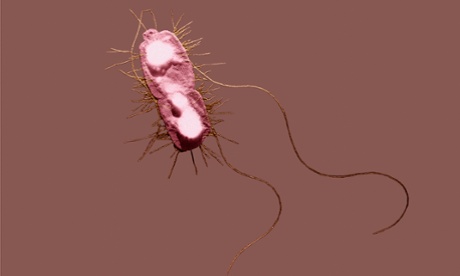Propane made with renewable process for the first time
Scientists modify E coli genes to produce gas that can power cars and heat homes
 Escherichia coli bacterium, commonly referred to as E coli. Photograph: Corbis
Escherichia coli bacterium, commonly referred to as E coli. Photograph: Corbis
A gas which can power cars and heat homes has been made using a renewable process for the first time.
Propane, which makes up the bulk component of liquefied natural gas (LPG), has previously only ever been produced from fossil fuels.
But a team of scientists at Imperial College in London has successfully demonstrated that they can make propane from glucose using a genetically engineered version of bacterium E coli.
“We can now make a product that until now was only available from fossil fuels and it’s chemically identical,” Patrik Jones, the lead author of the study published in the journal Nature Communications on Tuesday, told the Guardian. “It should work exactly the same as normal propane.”
Around 160,000 cars run on LPG in the UK, some of which have been converted from petrol or diesel engines by owners looking to save money at the pump. LPG has environmental benefits too, with greenhouse gas emissions up to 20% lower than unleaded petrol. Jones said he would eventually like to produce propane using solar energy.
The new work only produced tiny quantities of propane, but is a proof of concept that it could be produced without the need for its two usual sources of production – petrol refining and natural gas processing. “It’s not something that’s going to be used by industry today, but it is important and significant,” said Jones, who added he would need to scale up the production by three magnitudes to attract investors.
To make the propane, the team “hijacked the assembly line” of the biological process of fatty acid synthesis in E coli, introducing a group of enzymes (Thioesterase) into the bacterium. Two more enyzmes were then added to eventually turn the smelly fatty acid into propane.
Producing petrol or diesel = would be much more complex, Jones said. The team chose propane over other fuels on the grounds that it could be liquified, making it easier to transport, and done so with 30 times as less energy than it takes to liquify hydrogen, which has been proposed as another ‘green’ fuel source.
Jones said: “Fossil fuels are a finite resource and as our population continues to grow we are going to have to come up with new ways to meet increasing energy demands. It is a substantial challenge, however, to develop a renewable process that is low-cost and economically sustainable.
“At the moment algae can be used to make biodiesel, but it is not commercially viable as harvesting and processing requires a lot of energy and money. So we chose propane because it can be separated from the natural process with minimal energy and it will be compatible with the existing infrastructure for easy use.”
Propane made with renewable process for the first time | Environment | theguardian.com
Scientists modify E coli genes to produce gas that can power cars and heat homes
- Adam Vaughan
- theguardian.com, Tuesday 2 September 2014 16.00 BST

A gas which can power cars and heat homes has been made using a renewable process for the first time.
Propane, which makes up the bulk component of liquefied natural gas (LPG), has previously only ever been produced from fossil fuels.
But a team of scientists at Imperial College in London has successfully demonstrated that they can make propane from glucose using a genetically engineered version of bacterium E coli.
“We can now make a product that until now was only available from fossil fuels and it’s chemically identical,” Patrik Jones, the lead author of the study published in the journal Nature Communications on Tuesday, told the Guardian. “It should work exactly the same as normal propane.”
Around 160,000 cars run on LPG in the UK, some of which have been converted from petrol or diesel engines by owners looking to save money at the pump. LPG has environmental benefits too, with greenhouse gas emissions up to 20% lower than unleaded petrol. Jones said he would eventually like to produce propane using solar energy.
The new work only produced tiny quantities of propane, but is a proof of concept that it could be produced without the need for its two usual sources of production – petrol refining and natural gas processing. “It’s not something that’s going to be used by industry today, but it is important and significant,” said Jones, who added he would need to scale up the production by three magnitudes to attract investors.
To make the propane, the team “hijacked the assembly line” of the biological process of fatty acid synthesis in E coli, introducing a group of enzymes (Thioesterase) into the bacterium. Two more enyzmes were then added to eventually turn the smelly fatty acid into propane.
Producing petrol or diesel = would be much more complex, Jones said. The team chose propane over other fuels on the grounds that it could be liquified, making it easier to transport, and done so with 30 times as less energy than it takes to liquify hydrogen, which has been proposed as another ‘green’ fuel source.
Jones said: “Fossil fuels are a finite resource and as our population continues to grow we are going to have to come up with new ways to meet increasing energy demands. It is a substantial challenge, however, to develop a renewable process that is low-cost and economically sustainable.
“At the moment algae can be used to make biodiesel, but it is not commercially viable as harvesting and processing requires a lot of energy and money. So we chose propane because it can be separated from the natural process with minimal energy and it will be compatible with the existing infrastructure for easy use.”
Propane made with renewable process for the first time | Environment | theguardian.com
